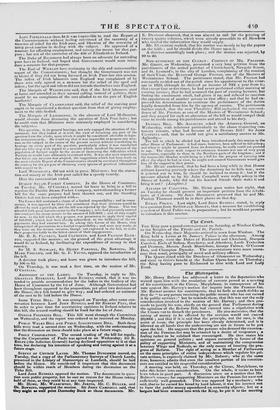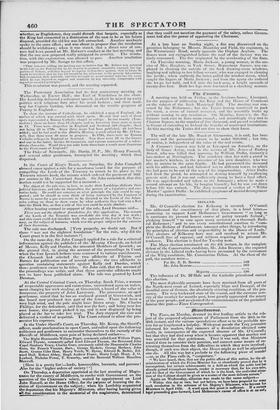fib¢ Wrap/MB.
Mr. Henry Bulwer has addressed a letter to the deputation who waited upon him with the resolution of censure passed at a meeting of his constituents at the Circus, Marylebone, in consequence of his vote against Mr. Harvey's motion for inquiry into the Pension-list. Mr. Bulwer assures his constituents, that he feels as much dislike as they do " to any person receiving the public money who has riot earned it by public services :" but he reminds them, that this was not the only consideration involved in the motion of Mr. Harvey; and then pro- ceeds to justify his vote, chiefly on the ground that Parliament during the agitation of the Reform Bill, had entered into a stipulation with the Crown not to disturb the pensioners. He also maintains, that the saving of money to be effected by the revision would not exceed 20,000/. ; and that if it is said that the principle, not the cost, is the point at issue, the principle has been already determined, and it is allowed on all hands that the undeserving are not in future to be put upon the list. He suggests that the persons who demand the examina- tion of the Pension-list may be actuated by a desire of vengeance ; a feeling rather to be subdued than encouraged. He then states his opinions on general politics ; and argues earnestly in favour of the policy of supporting Ministers, and of maintaining the compromise between Whigs and Radicals, as the only means of insuring the pro- gress of Reform. The right of acting as a Member of Parliament on the same principles of entire independence which regulate his pri- vate actions, is expressly claimed by Mr. Bulwer ; who at the same time, however, admits that even the smallest portion of his constitu- ents are entitled to his respectful consideration.
A meeting was held, on Thursday, at the Circus, Marylebone, to take this letter into consideration. On the whole, it seems to have been taken in good part. A discussion arose on a motion that Mr. Btilwer's reasons for supporting Ministers on the Pension-list were not
ufficiently well-grounded. '1 his was opposed by a mechanic; who aid, that as he earned his bread by bard labour, it was his interest not o have the public money squandered on unworthy objects ; but as a bargain had been entered into with the King, he put it to the meeting
whether, as Englishmen, they could disturb that bargain, especially as the King had consented to a diminution of the sum to be at his future disposal, provided the old list was left untouched. Another mechanic spoke to the same effect ; and was about to propose that the resolution should be withdrawn; when it was stated, that a direct vote of cen- sure had been passed on Mr. Bulwer's conduct at the last meeting, and
that the one now proposed really mitigated its severity. The resolu- tion, with this explanation, was allowed to pass. Another resolution was proposed by Mr. Savage to this effect, "That however w illing the meeting was to believe that Mr. Ilialwer was actuated in his vote on the Pension-list by his anxiety to promote unanimity amongst the sup- porter., or Reform. still they begged to express to lima their opinion. that in future he ought to recollect, Ilea he was not bound by his adherence to the present Administra- tion to sanction dale misdeeds. and that he ought to guard against injuring the cause which he was deputed to support and maintain by ally unworthy compromise with regard to eSSeili hil principles."
This resolution was passed, and the meeting separated.



























 Previous page
Previous page